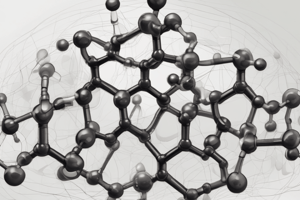Podcast
Questions and Answers
What type of reactions involve the addition of one or more atoms to a molecule or bond?
What type of reactions involve the addition of one or more atoms to a molecule or bond?
- Addition reactions (correct)
- Rearrangement reactions
- Substitution reactions
- Elimination reactions
Which functional group is represented by -COOH?
Which functional group is represented by -COOH?
- Ketone
- Carboxylic acid (correct)
- Aldehyde
- Alcohol
What is the process of assembling carbon-based molecules into a desired target compound called?
What is the process of assembling carbon-based molecules into a desired target compound called?
- Organic synthesis (correct)
- Reduction
- Substitution
- Fermentation
Which type of reaction involves the removal of one or more atoms from a molecule?
Which type of reaction involves the removal of one or more atoms from a molecule?
What role does organic chemistry play in understanding biochemistry?
What role does organic chemistry play in understanding biochemistry?
Which field focuses on designing sequences of reactions to construct complex molecules from simpler starting materials?
Which field focuses on designing sequences of reactions to construct complex molecules from simpler starting materials?
What is the central element in organic chemistry that allows for the formation of diverse compounds?
What is the central element in organic chemistry that allows for the formation of diverse compounds?
Which category of organic reactions involves the replacement of one atom or group of atoms in a molecule by another?
Which category of organic reactions involves the replacement of one atom or group of atoms in a molecule by another?
In organic chemistry, which types of reactions lead to the formation of new carbon-based molecules?
In organic chemistry, which types of reactions lead to the formation of new carbon-based molecules?
What is the primary focus of inorganic chemistry in contrast to organic chemistry?
What is the primary focus of inorganic chemistry in contrast to organic chemistry?
Which element allows carbon-based molecules to create a wide range of molecular structures in organic chemistry?
Which element allows carbon-based molecules to create a wide range of molecular structures in organic chemistry?
What type of reactions form the basis of organic chemistry and are responsible for creating new carbon-based molecules?
What type of reactions form the basis of organic chemistry and are responsible for creating new carbon-based molecules?
Flashcards are hidden until you start studying
Study Notes
Unveiling Organic Chemistry: Understanding Carbon's Diverse World
Organic chemistry, a fascinating discipline within the realm of chemistry, deals with the study of carbon-based compounds. Unlike its inorganic counterpart, organic chemistry focuses on the structures, properties, and reactions of molecules containing carbon, hydrogen, and other elements like oxygen, nitrogen, and halogens. This field has blossomed into an invaluable tool in our quest to understand the biological processes of living organisms and to develop innovative materials, pharmaceuticals, and fuels.
Carbon's Central Role
Carbon, with its unique ability to form covalent bonds, is at the heart of organic chemistry. This versatile element can bond with other carbon atoms, hydrogen, and various other elements, creating a broad array of molecular structures. This ability allows carbon-based molecules to form an incredible number of unique compounds with diverse properties and functions.
Organic Reactions and Mechanisms
Organic reactions—specific processes that lead to the formation of new carbon-based molecules from existing ones—are the bread and butter of organic chemistry. These reactions can be broadly categorized into several types:
- Substitution reactions: Here, one atom or group of atoms in a molecule is replaced by another. Examples include nucleophilic substitution reactions (like S_N2) and electrophilic aromatic substitution reactions (like Friedel-Crafts).
- Addition reactions: In these reactions, one or more atoms or groups of atoms are added to a molecule or bond. Examples include acid-catalyzed hydration of alkenes and Grignard reactions.
- Elimination reactions: These reactions involve the removal of one or more atoms or groups of atoms from a molecule. Examples include E1 and E2 reactions and dehydration of alcohols.
- Rearrangement reactions: In these reactions, a molecule undergoes a structural change without gaining or losing any atoms. Examples include the Claisen rearrangement and the Cannizzaro reaction.
Functional Groups and Bonding in Organic Molecules
Organic molecules typically contain functional groups, which are specific arrangements of atoms that impart characteristic properties and reactivity to the molecules that contain them. Examples of functional groups include alcohols (-OH), carboxylic acids (-COOH), aldehydes (-CHO), ketones (-CO-), amines (-NH2), and halogens (-X, where X = Cl, Br, I).
Organic Synthesis
Organic synthesis, the process of assembling carbon-based molecules into a desired target compound, is a central aspect of organic chemistry. Essentially, the field focuses on designing and implementing sequences of reactions to construct complex molecules from simpler starting materials. This process, often referred to as total synthesis, has been a critical component of the development of new drugs, agrochemicals, and materials.
Biochemistry and Organic Chemistry
Organic chemistry also plays a fundamental role in understanding biochemistry, the study of chemical processes within living organisms. Many biologically active molecules, like carbohydrates, lipids, proteins, and nucleic acids, are carbon-based. Organic chemistry not only helps elucidate the structure and function of these molecules but also contributes to the development of new drugs and therapeutic agents that target these molecules.
Conclusion
Organic chemistry is a vibrant and challenging field that encompasses a diverse array of topics, from the fundamental study of molecular structures to the development of new materials and drugs. With its broad applications and potential for innovation, organic chemistry continues to be an exciting area of study and research. As we delve deeper into the fascinating world of organic molecules, we can expect to discover new and exciting applications in countless fields, pushing the boundaries of human knowledge and ingenuity.
Studying That Suits You
Use AI to generate personalized quizzes and flashcards to suit your learning preferences.




